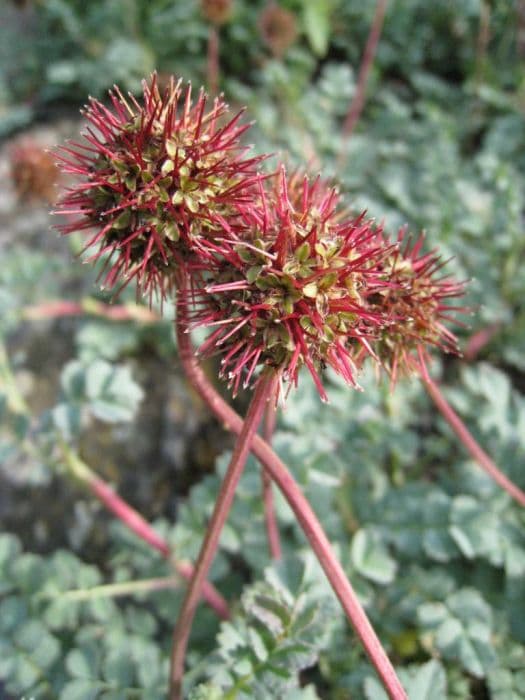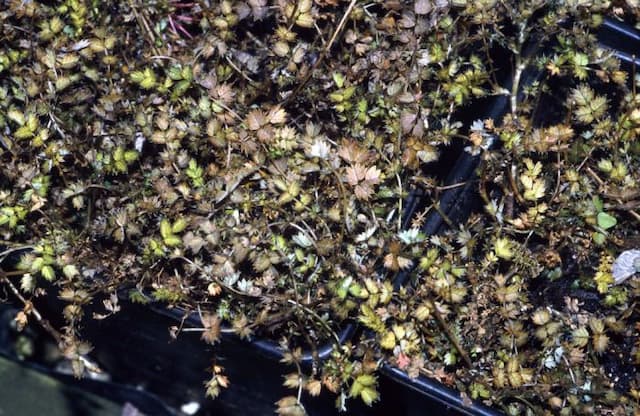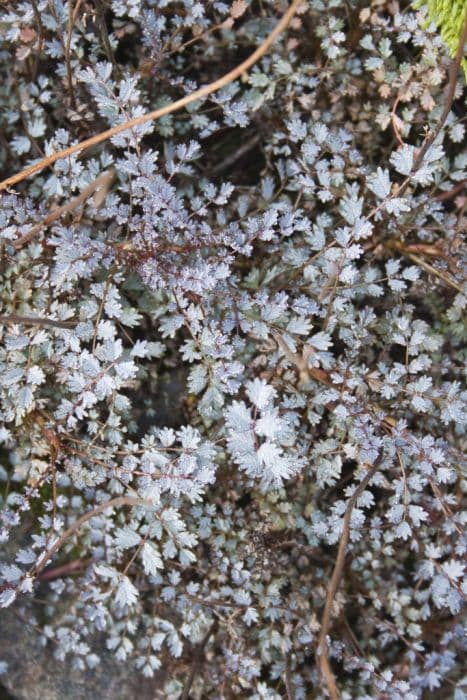Musk Rose Rosa moschata (Ra)

ABOUT
The musk rose is a plant known for its noteworthy and enchanting blooms that evoke a sense of classic romance and timeless elegance. The flowers are one of the most distinguishing features, commonly presenting in delicate clusters, with a soft, creamy white or sometimes pale pink hue that can be captivating to onlookers. Each blossom on the musk rose typically showcases a generous arrangement of petals that gracefully unfurl from the center, giving the flowers a plush, full-bodied appearance. The petals themselves have a silky texture that is delightful to touch, and they encase a pronounced group of golden stamens at the heart of the bloom, adding a burst of color to the otherwise creamy tones of the petals. In addition to their visual allure, the flowers emit a heady, sweet fragrance that is particularly strong in the evening or after a rain, hence the name musk rose, which refers to their characteristic scent. The leaves of the musk rose are compound with a deep green color, providing a lush backdrop that further accentuates the beauty of the blooms. Shakespearean in its influence, the musk rose possesses a timeless charm reflected in its classic form and enchanting perfume. Overall, the musk rose is a plant that can captivate not only with its visual beauty but also with its delightful aromatic presence.
About this plant
 Names
NamesFamily
Rosaceae
Synonyms
Musk Rose, Muscat Rose, Moorish Rose, Rosa Moschata
Common names
Rosa moschata, Rosa brunonii, Rosa lindleyana.
 Toxicity
ToxicityTo humans
The Rosa moschata, commonly known as musk rose, is generally considered non-toxic to humans. In fact, various parts of the musk rose, including the hips, have been used in traditional medicine and can be consumed when prepared properly. There are no common symptoms of poisoning from this plant because it is not toxic. However, like any other plant, individual allergies can occur, and it's advisable to exercise caution if you're sensitive to plants in the Rosaceae family.
To pets
The Rosa moschata, or musk rose, is not known to be toxic to pets either. It is generally considered safe, and there are no typical symptoms of poisoning associated with this plant. However, as with any plant, it is possible for pets to have individual allergies or to experience gastrointestinal upset if they consume large quantities of non-food items, including parts of the musk rose. If your pet is showing signs of distress after ingesting this plant, it's best to consult a veterinarian.
 Characteristics
CharacteristicsLife cycle
Perennials
Foliage type
Deciduous
Color of leaves
Green
Flower color
White
Height
5-15 feet (1.5-4.5 meters)
Spread
5-15 feet (1.5-4.5 meters)
Plant type
Shrub
Hardiness zones
6-9
Native area
Himalayas
Benefits
 General Benefits
General Benefits- Ornamental value: Rosa moschata, commonly known as the musk rose, is widely cultivated for its elegant and fragrant white flowers, which add aesthetic appeal to gardens and landscapes.
- Landscape design versatility: The musk rose's climbing habit makes it suitable for a variety of landscaping uses, such as trellises, arbors, walls, and fences.
- Wildlife habitat: Musk rose provides food and shelter for beneficial insects and birds, offering ecological support to garden ecosystems.
- Cultural significance: The musk rose has historical importance and has been featured in literature, symbolizing love and beauty, which enriches cultural garden themes.
- Cultivation variety: Breeders often use Rosa moschata in hybridization to develop new rose cultivars, owing to its desirable traits, enhancing the diversity of rose varieties available.
- Habitat restoration: Planting native species like the musk rose can contribute to the replenishment and balance of local flora, aiding in the restoration of natural habitats.
- Aromatherapy and perfumery: The musk rose is valued for its scent in the creation of fragrances and use in aromatherapy for its soothing qualities, excluding therapeutic claims.
 Medical Properties
Medical Properties- Anti-inflammatory properties: Rosa moschata, widely known as Musk Rose, has been traditionally used to help reduce inflammation.
- Antioxidant activity: The flowers and seeds of Musk Rose are believed to be high in antioxidants, which can help to protect cells from oxidative stress.
- Skin healing: Musk Rose oil, derived from the seeds of the plant, is used in skincare formulations for its potential to help in healing and regenerating skin tissues.
- Hydrating and moisturizing: The oil from Musk Rose is renowned for its hydrating properties, making it beneficial for maintaining skin moisture balance.
- Anti-aging effects: Due to its potential ability to improve skin texture and elasticity, Musk Rose oil is commonly incorporated in cosmetics for anti-aging benefits.
 Air-purifying Qualities
Air-purifying QualitiesThis plant is not specifically known for air purifying qualities.
 Other Uses
Other Uses- As a natural dye: The petals of the musk rose can be used to create a delicate and natural dye for fabrics and artwork.
- In perfumery: The musk rose has a subtle yet captivating fragrance which is used in creating perfumes and scented oils.
- In cosmetics: Musk rose petals can be infused in oils or distilled to make rose water, which is used in various skincare and beauty products.
- In gourmet cooking: The rose hips from musk rose can be used in recipes for jams, jellies, and syrups, adding a unique floral flavor.
- Garden design: The musk rose's sprawling habit and attractive blooms make it an ideal choice for cottage gardens or as a natural-looking barrier.
- In companion planting: Musk rose can be planted alongside other crops to attract beneficial insects and enhance garden biodiversity.
- For crafting: Dried musk rose petals are popular in potpourri mixes and can be used for decorating candles and handmade soaps.
- As a flavoring agent: Musk rose petals can be added to teas, infusing them with a delicate rose flavor and aroma.
- In floral arrangements: Fresh or dried musk rose blooms are often used in bouquets for their beauty and subtle fragrance.
- For cultural traditions: In some regions, musk rose petals may be used in ceremonial activities or traditional weddings as a symbol of love and purity.
Interesting Facts
 Feng Shui
Feng ShuiThe Musk Rose is not used in Feng Shui practice.
 Zodiac Sign Compitability
Zodiac Sign CompitabilityThe Musk Rose is not used in astrology practice.
 Plant Symbolism
Plant Symbolism- Love: As a member of the rose family, Musk Rose typically symbolizes love. The presence of its blooms in gardens and arrangements often represents deep affection and enduring passion.
- Beauty: The Musk Rose, with its delicate and attractive flowers, serves as a symbol for natural beauty and often conveys admiration for someone's physical and inner grace.
- Mystery: The musky fragrance and the origins of the Musk Rose, which were initially unclear and mysterious, lend the flower a sense of mystery, often symbolizing the unknown or undiscovered.
- Sensuality: The intoxicating scent of the Musk Rose is linked with sensuality, implying a deep connection with the physical senses and often tied to romantic encounters.
- Fleeting Nature of Life: Much like other roses, the Musk Rose’s brief blooming period is a reminder of life’s transient nature, encouraging one to cherish each moment.
 Water
WaterMusk roses, or Rosa moschata, should be watered deeply once a week, providing around 1 to 1.5 gallons of water per plant. This ensures that the water reaches the deep roots, promoting stronger growth. During hot, dry periods, watering frequency should increase to twice per week. It's important to avoid overhead watering to minimize the risk of leaf diseases; instead, water at the base of the plant. Always check the soil moisture before watering – the soil should be moist but not waterlogged.
 Light
LightMusk roses thrive in full sun, requiring at least six hours of direct sunlight each day for best flowering. Planting them in a spot that receives morning sun is ideal, as it helps to dry dew from the leaves and can reduce the risk of fungal diseases. They will tolerate partial shade, but their blooming might be reduced in less than optimal light conditions.
 Temperature
TemperatureMusk roses prefer a temperature range of 60 to 70 degrees Fahrenheit for optimal growth, but they can tolerate temperatures down to 20 degrees Fahrenheit. They can withstand brief periods of colder temperatures, but prolonged exposure to temperatures below this minimum can damage or kill the plant. Avoid exposing them to temperatures above 90 degrees Fahrenheit as this can stress the plant and impact flowering.
 Pruning
PruningPrune musk roses in late winter or early spring to remove dead wood and to shape the plant. Pruning is also done to encourage air circulation, which reduces the chance of fungal diseases, and to improve light penetration for better flowering. Annually, about one-third of the oldest canes should be removed to rejuvenate the plant. Always use clean, sharp tools to make clean cuts at a 45-degree angle just above an outward-facing bud.
 Cleaning
CleaningAs needed
 Soil
SoilMusk Rose thrives in well-drained, loamy soil with a pH of 6.0 to 6.5. The best soil mix includes equal parts garden soil, compost, and coarse sand to ensure good drainage and fertility.
 Repotting
RepottingMusk Rose does not typically require repotting as it's a shrub planted outdoors, but if grown in a pot it may need repotting every 2 to 3 years to refresh the soil.
 Humidity & Misting
Humidity & MistingMusk Rose prefers average humidity conditions and does not require any special humidity levels to thrive as long as it's planted outdoors in its natural environment.
 Suitable locations
Suitable locationsIndoor
Grow Musk Rose indoors with ample light and careful pruning.
Outdoor
Plant Musk Rose in sunny spots with well-draining soil.
Hardiness zone
6-9 USDA
 Life cycle
Life cycleThe Rosa moschata, commonly known as the Musk Rose, begins its life cycle with seed germination, occurring in spring under suitable warmth and moisture conditions. After germination, seedlings emerge and develop into juvenile plants, establishing a root system and producing their first set of true leaves. The vegetative growth phase follows, with the Musk Rose developing a strong stem, complex roots, and foliage, responding to seasonal cues to manage energy investment. Once mature, which can take two to four years, the plant enters the reproductive stage, characterized by the blossoming of fragrant, creamy-white flowers from late spring to early autumn, attracting pollinators for sexual reproduction. Following pollination, the flowers develop into rose hips (fruit), containing seeds that once mature, are dispersed by various means, including animals and gravity. The plant continues its cycle by remaining perennially active, with phases of dormancy in colder weather, only to resume growth in the following spring.
 Propogation
PropogationPropogation time
Spring-Early Summer
Propogation: The most popular method of propagating the Musk Rose (Rosa moschata) is through softwood cuttings, which is usually done in late spring to early summer when new growth is mature enough yet still tender. To propagate by this method, a gardener takes cuttings of about 4 to 6 inches (10 to 15 centimeters) long from a healthy parent plant, ensuring each cutting has at least a couple of leaves. The bottom end of the cutting is then dipped in a rooting hormone to encourage root development and planted in a mix of moistened soil and perlite. It's important to maintain high humidity around the cuttings by covering them with a plastic bag or placing them in a propagator, and to keep them in bright, indirect light until roots have developed, which can take several weeks. Once rooted, the cuttings can be transplanted into individual pots to grow on until they are strong enough to be planted out in the garden.









